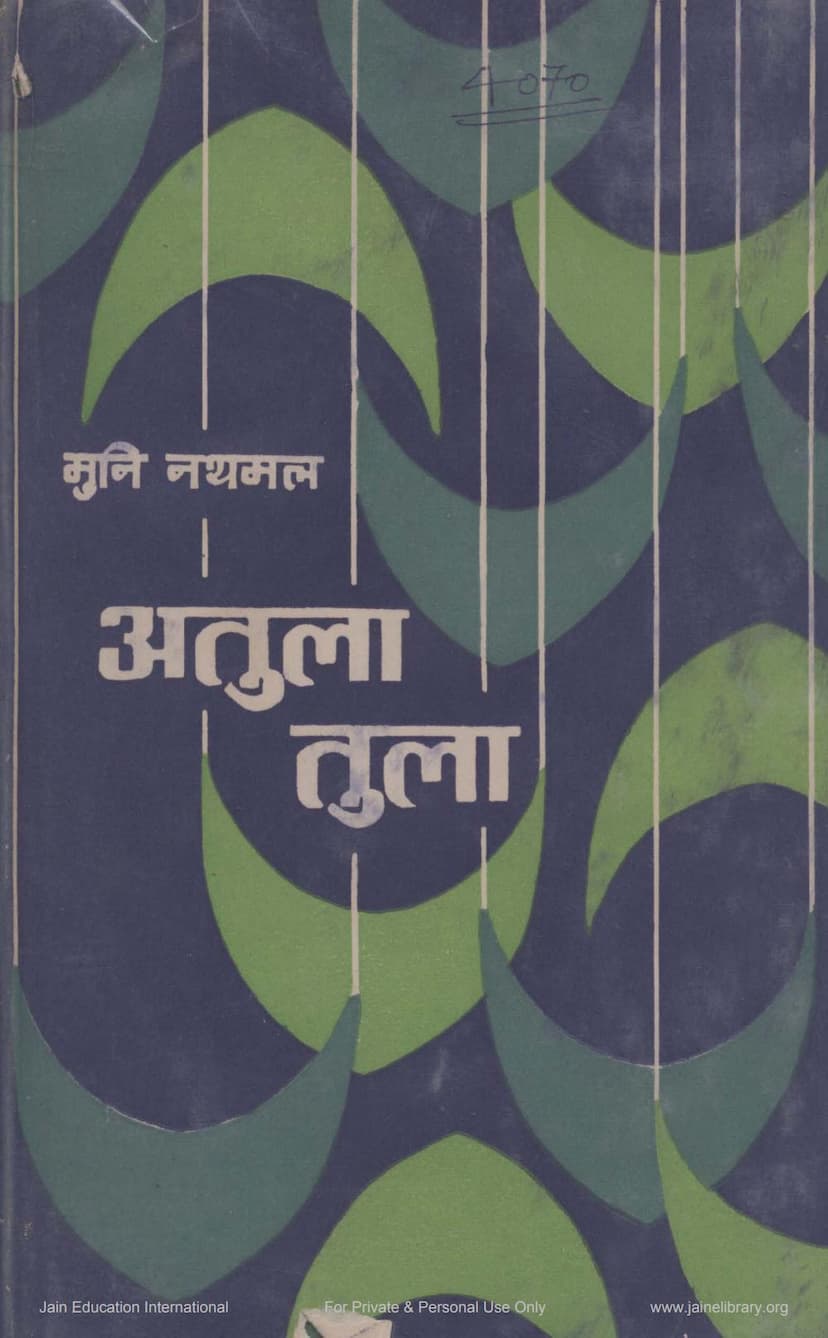Atula Tula
Added to library: September 1, 2025

Summary
Here's a comprehensive summary of the Jain text "Atula Tula" by Muni Nathmal, based on the provided pages:
Book Title: Atula Tula Author: Muni Nathmal Publisher: Adarsh Sahitya Sangh
Overall Nature of the Work:
"Atula Tula" is a compilation of Sanskrit poems and verses composed by Muni Nathmal over a period of 35 years (1940-1975). The work showcases his mastery of Sanskrit poetry and his ability to engage with diverse subjects, ranging from philosophical contemplation and personal reflections to immediate responses to given themes ("ashu-kavitva"). The book is structured into five sections: "Vivdha" (Various), "Ashukavitva" (Impromptu Poetry), "Samasyapurti" (Problem Solving Verses), "Unmesha" (Glimpses/Insights), and "Stuti-Chakra" (Cycle of Praise).
Author's Philosophy and Approach:
Muni Nathmal, a Jain monk, states in his preface that his life's journey has been both external and internal. While striving for detachment from the external world, he acknowledges being influenced by external events, experiencing their impact and reactions. His "kavitva" (poetry) arises from the sentiments, emotions, and expression that emerged during these moments of influence, impact, and response.
He distinguishes between poems that arise from spontaneous inspiration ("sahaj sphurana") and those written in response to specific themes or problems presented by scholars. The latter, while demonstrating intellectual prowess, sometimes lean more towards intellectualism than pure poetry.
Muni Nathmal emphasizes that his primary goal is not literary creation but the pursuit of self-realization and proximity to the soul. He sees himself as a symbol of effort ("purusharth") in the three aspects of spiritual practice: knowledge, faith, and conduct.
Key Themes and Content:
The book covers a wide spectrum of themes, reflecting Muni Nathmal's intellectual curiosity and spiritual depth:
- Self-Reflection and Identity (Appanivedanam): The opening section explores the nature of spiritual seeking, the role of faith over mere knowledge, and the importance of self-reliance and inner strength. It also touches upon the complexities of human relationships and the pursuit of truth.
- Philosophical Observations (Nimeshonmesha, etc.): Many verses delve into observations about emptiness, sleep, love, hypocrisy, flaws, victory, detachment, and the nature of wealth. These often use natural phenomena as metaphors for deeper truths.
- Social and Political Commentary (Swatantra Bharat Geeti, Rashtrasangh, Loktantra ka Uday): Muni Nathmal reflects on the loss of true Indian culture, the challenges of self-rule, the rise of democracy, and the need for ethical conduct in governance and societal interaction.
- Aesthetic and Natural Beauty (Meghashtakam, Samudrashtakam, Padmapanchadashakam, Gangasnahanam, etc.): The poems often capture the essence of nature, from clouds and oceans to lotuses and rivers, poetically describing their forms, behaviors, and the lessons they offer.
- "Ashu-Kavitva" and "Samasyapurti" (Impromptu Poetry and Problem Solving): This significant portion of the book highlights Muni Nathmal's remarkable ability to compose poetry on the spot, responding to challenges posed by scholars. These verses demonstrate his command of Sanskrit, his philosophical acumen, and his wit. Examples include responding to themes like "Ekta" (Unity), "Taj Mahal," "Sanskrit Language Opposition," "Dead Language," "Culture," "Violence-Non-violence," and various complex poetic problems.
- Praise and Devotion (Acharayastuti, Mahavir Ashtak, Siddha Stavan, etc.): The book includes sections dedicated to praising his spiritual guides, such as Acharya Tulsi and Kalu Muni, and to venerating Lord Mahavir and the Siddhas. These devotional verses express deep reverence and gratitude.
- Life Lessons and Morality (Adhyatm Tula, Katha Shlokas, etc.): Several poems offer moral guidance, drawing lessons from stories and observations on topics like self-reliance, the consequences of actions, and the importance of discernment.
Key Takeaways:
- The Power of Faith: The repeated emphasis on "Shraddha" (faith) as a guiding force, even over knowledge, is a prominent theme.
- The Interplay of Inner and Outer Worlds: Muni Nathmal's poetry demonstrates a constant interplay between his internal spiritual journey and his observations of the external world.
- Mastery of Sanskrit Poetry: The book is a testament to his profound understanding and creative application of Sanskrit grammar, meter, and poetic devices.
- The Importance of Detachment and Self-Control: Many verses subtly convey the Jain principles of detachment, self-control, and the pursuit of spiritual liberation.
- "Ashu-Kavitva" as a Demonstrative Skill: The inclusion of impromptu verses showcases not only his poetic talent but also his intellectual preparedness and ability to articulate complex ideas under pressure.
- Guidance and Inspiration: The collection aims to offer guidance and inspiration to readers on their spiritual and philosophical journey.
In essence, "Atula Tula" is a rich and multifaceted work that offers a glimpse into the mind and spiritual evolution of Muni Nathmal, presenting profound philosophical insights and poetic beauty in the classical Sanskrit language.